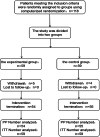Enhancing gestational diabetes mellitus education: a randomized controlled trial of King's theory and FMEA-PDCA integration for improved patient outcomes
- PMID: 41076518
- PMCID: PMC12514800
- DOI: 10.1186/s12884-025-07932-2
Enhancing gestational diabetes mellitus education: a randomized controlled trial of King's theory and FMEA-PDCA integration for improved patient outcomes
Abstract
Background: Gestational Diabetes Mellitus (GDM) is a common pregnancy complication that poses significant risks to both maternal and neonatal health, including preterm birth and macrosomia. Traditional GDM health education methods often lack clinical effectiveness due to insufficient personalized feedback and timely evaluation. This gap arises from the inadequate integration of nursing theories and quality management tools. This study explores the efficacy of combining King’s Theory of Goal Attainment with the Failure Modes and Effects Analysis (FMEA) and the Plan-Do-Check-Act (PDCA) cycle as a novel approach to health education for GDM patients.
Methods: This randomized controlled trial involved pregnant women attending tertiary hospitals in Fujian Province from March 1, 2022, to May 31, 2023. Participants (n = 118) were randomly assigned to either an innovative health education group (integrating King’s Theory and FMEA-PDCA) or a conventional education group. Outcomes were assessed pre- and post-intervention, including blood glucose levels, glycated hemoglobin (HbA1c), anxiety levels, quality of life, and pregnancy outcomes.
Results: The experimental group showed significantly improved fasting blood glucose, reduced anxiety, and enhanced quality of life (P < 0.001). Additionally, the rate of cesarean sections was lower (P = 0.037) compared to the control group. However, no significant differences were observed in HbA1c levels (P = 0.671) or pregnancy-related complications (P > 0.05).
Conclusion: The integration of King’s Theory and FMEA-PDCA in health education significantly improves educational outcomes and clinical results for GDM patients, presenting a promising strategy for clinical practice.
Trial registration:
The study was retrospectively registered on 25 April 2024 (registration number: ChiCTR2400083435) by the Chinese Clinical Trial Registry:
Supplementary Information: The online version contains supplementary material available at 10.1186/s12884-025-07932-2.
Keywords: Gestational diabetes mellitus; Health education; King’s theory of goal attainment; Quality management tool.
Conflict of interest statement
Declarations. Ethics approval and consent to participate: All clinical patient sample collection activities conducted during the research process were submitted for review by the Medical Ethics Committee of Anxi County Hospital in Quanzhou City, Fujian Province, China (Approval Number: 20220002). This study was conducted in accordance with the ethical principles outlined in the Declaration of Helsinki. The Chinese version of the ethical approval document has been provided (uploaded in the in the related files). Principles of voluntariness, confidentiality, and beneficence were strictly followed.Written informed consent was obtained from all participants prior to their inclusion in the study. Consent for publication: Not applicable. Competing interests: The authors declare no competing interests.
References
-
- Dunn P, Conard S. Improving health literacy in patients with chronic conditions: a call to action. Int J Cardiol. 2018;273:249–51. 10.1016/j.ijcard.2018.08.090. - PubMed
LinkOut - more resources
Full Text Sources
Miscellaneous


